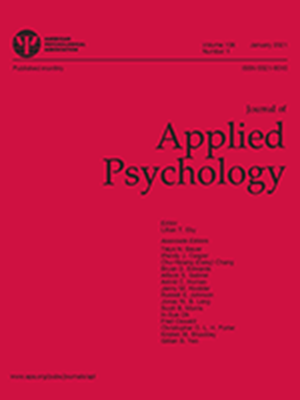冲击后:谦逊的领导能提高员工在冲击事件后的适应能力。
IF 6.1
1区 心理学
Q1 MANAGEMENT
引用次数: 0
摘要
冲击性事件具有很强的破坏性,会威胁到员工的绩效,增加他们辞职的风险。然而,很少有研究关注领导者如何帮助员工在震惊事件发生后进行调整。我们利用社会化的文献来建立关于领导者如何帮助员工成功地调整和适应冲击事件的理论。我们认为,谦逊的领导者——因为他们愿意从员工的冲击相关经验中学习和看到价值——将更有可能使用调整行为来减少员工流失率并提高员工绩效。将COVID-19大流行作为一个几乎普遍的冲击事件,我们在两项多源现场研究(N = 2392)中发现了我们假设影响的证据。具体而言,我们发现谦逊的领导与肯定员工的冲击相关经验,并给予员工在冲击后如何处理工作的自主权,最终减少流失率,提高员工绩效呈正相关。(PsycInfo Database Record (c) 2025 APA,版权所有)。本文章由计算机程序翻译,如有差异,请以英文原文为准。
After shocks: Humble leadership improves employee adjustment following shock events.
Shock events are highly disruptive, threatening employees' performance and increasing the risk that they quit. Yet, little research has focused on how leaders can help employees adjust in the wake of shock events. We draw on the socialization literature to build theory about how leaders can help employees successfully adjust and adapt following shock events. We propose that humble leaders-because they are open to learning from and seeing value in employees' shock-related experiences-will be more likely to use adjustment behavior that reduces employee turnover and promotes employee performance. Focusing on the COVID-19 pandemic as a nearly universal shock event, we find evidence for our hypothesized effects across two multisource field studies (N = 2,392). Specifically, we find that humble leadership is positively related to affirming employees' shock-related experiences and giving employees autonomy over how they approach work following shock, ultimately reducing turnover and enhancing employee performance. (PsycInfo Database Record (c) 2025 APA, all rights reserved).
求助全文
通过发布文献求助,成功后即可免费获取论文全文。
去求助
来源期刊

Journal of Applied Psychology
Multiple-
CiteScore
17.60
自引率
6.10%
发文量
175
期刊介绍:
The Journal of Applied Psychology® focuses on publishing original investigations that contribute new knowledge and understanding to fields of applied psychology (excluding clinical and applied experimental or human factors, which are better suited for other APA journals). The journal primarily considers empirical and theoretical investigations that enhance understanding of cognitive, motivational, affective, and behavioral psychological phenomena in work and organizational settings. These phenomena can occur at individual, group, organizational, or cultural levels, and in various work settings such as business, education, training, health, service, government, or military institutions. The journal welcomes submissions from both public and private sector organizations, for-profit or nonprofit. It publishes several types of articles, including:
1.Rigorously conducted empirical investigations that expand conceptual understanding (original investigations or meta-analyses).
2.Theory development articles and integrative conceptual reviews that synthesize literature and generate new theories on psychological phenomena to stimulate novel research.
3.Rigorously conducted qualitative research on phenomena that are challenging to capture with quantitative methods or require inductive theory building.
 求助内容:
求助内容: 应助结果提醒方式:
应助结果提醒方式:


